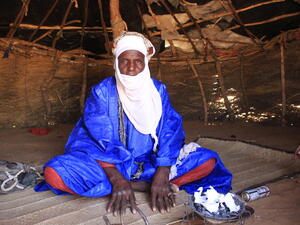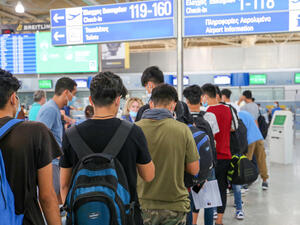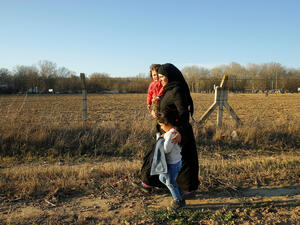More than 62,000 people, mostly Ethiopians, risk lives to cross Gulf of Aden this year
More than 62,000 people, mostly Ethiopians, risk lives to cross Gulf of Aden this year

A group of people hoping to reach Yemen wade out to a boat off the coast of Somalia.
GENEVA, November 8 (UNHCR) - The UN refugee agency said on Friday it was highly concerned about the high number of people risking their lives to reach Yemen after recording more than 62,000 sea arrivals in the first 10 months of this year.
UNHCR spokesman Adrian Edwards said Yemen had seen six successive years of high arrivals by sea. "Last year, a record 107,532 people made the crossing. And although this year's numbers are, so far, lower than in 2012 - 62,194 from January through October compared to 88,533 for the same period last year - the Gulf of Aden remains one of the world's most travelled sea routes for mixed migration [asylum-seekers and migrants]," he told journalists in Geneva.
In total, since 2006 when UNHCR began collecting data, more than half-a-million asylum-seekers, refugees and migrants have travelled by sea to Yemen. Most are Ethiopians, (51,687 in 2013) citing the difficult economic situation at home and often hoping to travel through Yemen to the Gulf States and beyond.
Somalis arriving in Yemen (10,447 in 2013) are automatically recognized as refugees by the authorities, while UNHCR helps determine the refugee status of other asylum-seekers, including from Ethiopia, Eritrea, and other countries.
The crossing from the Horn of Africa to Yemen is one of several deadly sea routes worldwide that UNHCR watches closely. Hundreds of people, including Syrian refugees, have died in recent months crossing the Mediterranean to Europe. In South-east Asia, just last weekend, dozens of people were reported missing after their boat capsized off the coast of Myanmar in the Bay of Bengal.
"Among the steps UNHCR takes to address these trends, we encourage cooperation among countries affected by mixed migration. And we are supporting the Yemeni government to organize a conference next week on asylum and migration together with the International Organization for Migration," spokesman Edwards said.
The three-day conference is scheduled to open on Monday in the Yemen capital, Sana'a. Participants include governments from the Horn of Africa, Gulf States, donor countries, NGOs and institutions such as the Regional Mixed Migration Secretariat. The aim of the Yemen conference is to establish a regional plan to help manage mixed migration between the Horn of Africa and the Arabian Peninsula.
The objectives of that plan include: Saving lives; ensuring better protection systems for asylum-seekers and refugees, easing the suffering of migrants and the communities that host them; strengthening law enforcement against smuggling and trafficking networks; increasing funding for assisted voluntary returns programmes for stranded migrants; expanding available options for legal migration; and raising awareness of the dangers of irregular migration.








